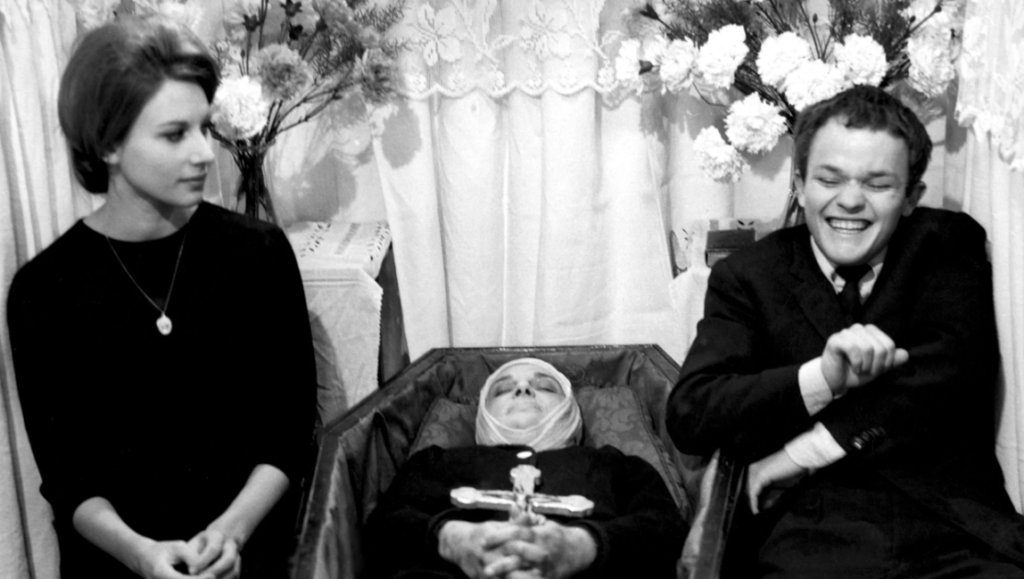“Whatever was going to happen has already happened,” says the protagonist of Marco Bellocchio’s 1965 debut feature, Fists in the Pocket (I pugni in tasca). This is one of many tautologies Alessandro (Lou Castel) will pronounce throughout the film, adding to an already stifling cinematic experience that sardonically skewers the institutions of family, marriage, and Catholicism — the very foundations of Italian culture and the mainstays of neorealist Italian cinema that Bellocchio so effectively excoriates. Shot in Belloccio’s childhood home in the northern Italian countryside, Fists in the Pocket is a grim fable of extreme family dysfunction, complete with incest, epilepsy, and murder. Of the blind matriarch’s four grown children, only the eldest, Augusto (Marino Masé), is unafflicted. Listless, bratty Alessandro spends his time trolling schoolchildren and spying on his sister, while Giulia (Paola Pitagora) sends Augusto’s fiance threatening notes cut from magazine letters. Taciturn, morose Leone (Pierluigi Troglio), the youngest, sums it all up: “what torture, living in this house.” All three siblings are epileptic, but only Sandro considers this a reason for homicide. Ostensibly, dispatching the rest of the family — himself included — will free Augusto, the only one with a future, from the thankless burden of being their caretaker. Alessandro’s authority to make this decision seems based solely on an unchecked talent for wreaking ferociously calculated havoc. The fact that his plan is allowed to escalate at all speaks to the hypnotizing inertia of this family’s existence; despite acting like feral animals, their daily life is mired in idle, semi-bourgeois banalities such as tutoring, sunbathing, and preening before the mirror. Their father is never mentioned and money is a source of worry, matter-of-factly accepted as a justification for murder. When Alessando shares his plan with Augusto, it’s during a car ride in which Augusto drives, navigating twisting, shadowed streets as wide as hallways. We never see his face and Alessandro is only in profile; there’s no sense of their destination and no urgency at all. Is this conversation a reflection of Alessandro’s self-loathing — an elaborate scheme to orchestrate his own demise — or is he projecting Augusto’s repressed desires onto himself? Is he reciting a suicide note or a pre-emptive confession? Throughout this dreamlike sequence, in which Sandro appears to monologue to a faceless audience, it becomes clear that his warped sense of entitlement, which encompasses a total lack of morality, guilt, or shame, is Augusto’s only chance for freedom.
These primal modalities — repression and release, singular and whole — are pitted against age-old Italian institutions, bringing to the film’s neorealist forbears an unflinching portrait of familial dysfunction that represents the crumbling of society as a whole.
Though the title points to clenched fists, Bellocchio also fills the screen with shots of the characters’ grasping, scuttling hands. They are always cut off at the wrists and in motion, measuring the length of a weapon or inching to and away from an invisible object, or simply choosing a piece of fruit. In this toxic household, these attempts to claw for nourishment, protection, or companionship mutate into gestures of hatred and greed. Set against these carefully considered sequences are shots of frantic, animalistic frenzy, as characters tumble over furniture and fling themselves in any direction that takes their momentary interest. The film is full of unexpected hisses and grotesque, jerking movements: characters with restless bodies that defy domestication and combative energy that quickly turns fatal. The family throbs with its own off-kilter logic and survives as a singular, self-contained mass, like a tumor. These primal modalities — repression and release, singular and whole — are pitted against age-old Italian institutions, bringing to the film’s neorealist forbears an unflinching portrait of familial dysfunction that represents the crumbling of society as a whole. Tearing through the family villa, burning their mother’s things in the same courtyard where, during her funeral, altar boys roughhoused, Sandro and Guilia embody Bellocchio’s anarchic vision of Italian culture, down to the current of eroticicism that bubbles beneath Pitagola’s performance. Meanwhile, Ennio Morricone’s haunting soundtrack brilliantly underscores the siblings’ skulking, airless existence, the threat of the next epilepsy fit hovering over the house with the inevitability of a plague. The movie’s final scene is a cooly confident encapsulation of Bellocchio’s deeply cynical thesis: in this world, you must fend for yourself or perish. Fists in the Pocket teems with ugly urges and illicit desires, yet it’s the final moment of restraint that unforgettably succeeds in wrenching the knife even deeper.
Part of Kicking the Canon – The Film Canon.


Comments are closed.